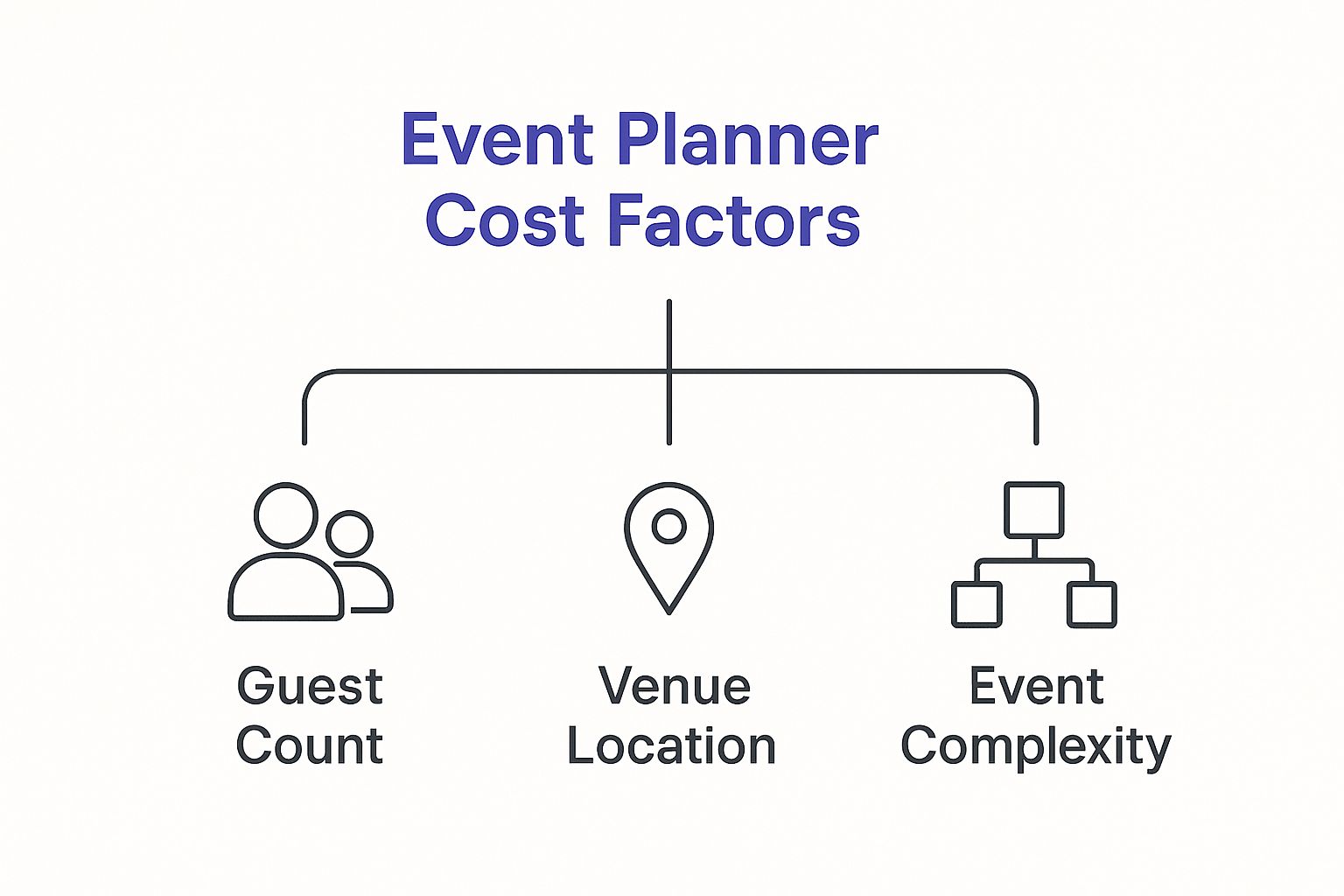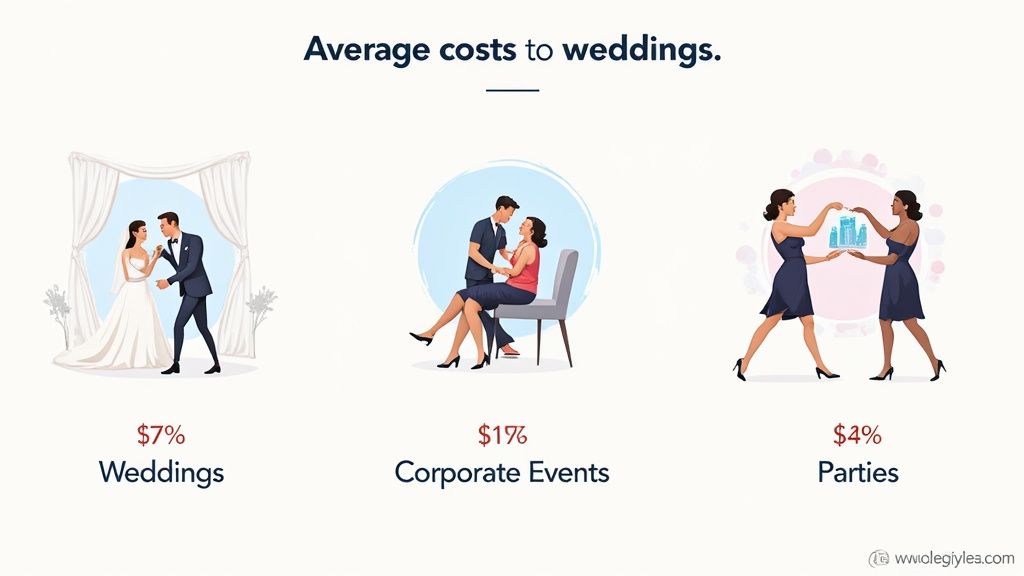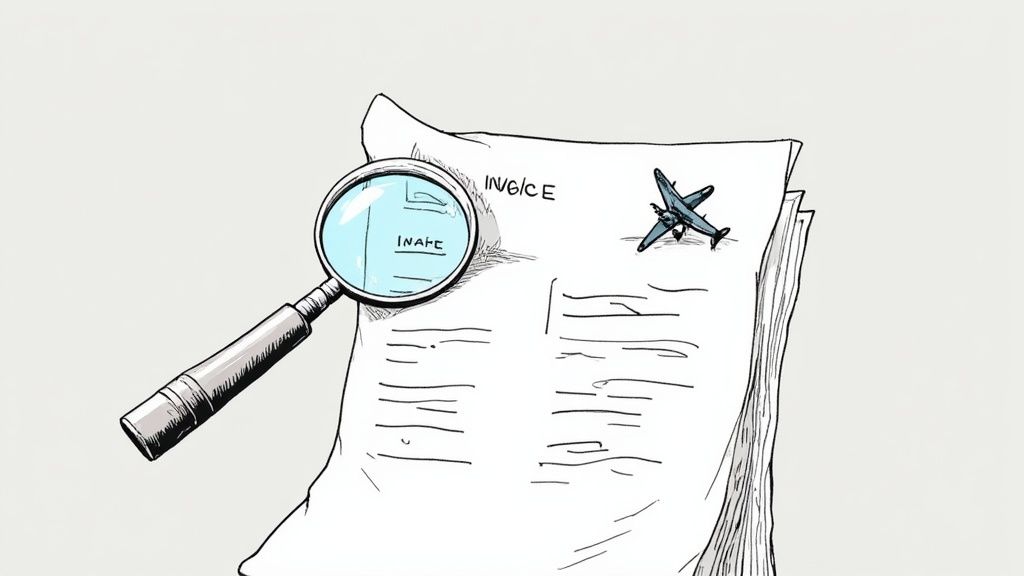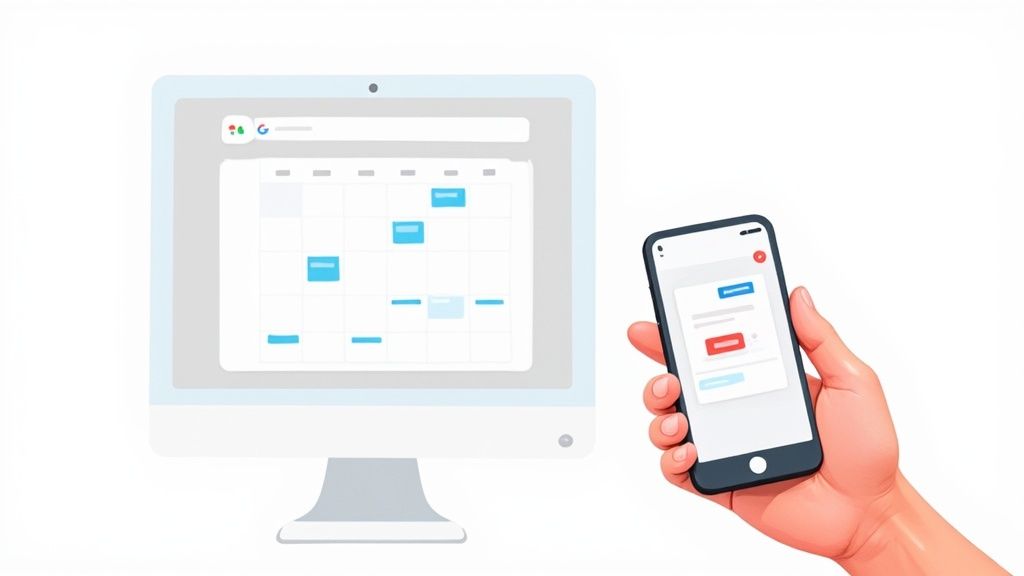So, you're thinking about hiring an event planner. Smart move. One of the first questions that probably pops into your head is, "What's this going to cost me?"
It’s a fair question, and the answer isn't always straightforward. While a common rule of thumb is that planners charge a fee that’s 15-20% of the total event budget, that's just a starting point. The final price tag really boils down to how they structure their fees.
Decoding How Event Planners Charge for Their Services
Before you can nail down a budget for professional help, you've got to understand the different ways planners get paid. Think of it like hiring a contractor for a home renovation. You might pay them a percentage of the total project cost, a fixed price for the whole job, or just by the hour for their time. Event planners work with these same basic principles.
Your planner will almost certainly use one of three main pricing models: a percentage of the budget, a flat-fee package, or an hourly rate. Each one has its place and is better suited for certain types of events.
The Three Core Pricing Models
- Percentage of Budget: This is the go-to model for large, complex events like a big corporate conference or a multi-day wedding weekend. The planner's fee is simply a set percentage of what you spend in total.
- Flat-Fee Packages: Perfect for events with a clearly defined scope. Think milestone birthday parties or "day-of" wedding coordination where the to-do list is known upfront. You pay a single price for a specific set of services. No surprises.
- Hourly Rate: This model gives you flexibility. It's often used for one-off consultations, for events where the scope is a bit fuzzy, or when you only need a limited amount of help to get you over the finish line.
Globally, the percentage-based model is incredibly common because it scales so well, whether you're planning an intimate gathering or a massive festival. Most pros in the industry charge between 10% and 20% of the total budget for their expertise, with the exact number depending on just how complex your event is. You can find out more about how planners establish their fees and what goes into that calculation.
To give you a clearer picture, let's break down the main pricing structures in a quick table.
Event Planner Pricing Models at a Glance
| Pricing Model | How It Works | Best For | Typical Range |
|---|---|---|---|
| Percentage-Based Fee | The planner takes a percentage of the total event costs. | Large, complex events like weddings, galas, and corporate conferences. | 15-20% of the event budget |
| Flat-Fee Package | A fixed price for a pre-defined set of services. | Events with a clear scope, like day-of coordination or small parties. | $1,000 - $10,000+ |
| Hourly Rate | You pay for the planner's time, billed by the hour. | Consultations, small tasks, or events with an uncertain scope. | $75 - $250+ per hour |
Each of these models has its pros and cons, and the best fit really depends on the specifics of your event and your comfort level with different payment styles.
The following visual lays out the key factors that really drive the final cost, no matter which pricing model you're looking at.

As you can see, things like the event's scale, its location, and the sheer complexity of what you're trying to pull off are huge drivers of the final price. The first step to a great partnership with a planner is figuring out which pricing structure makes the most sense for your event's scope, budget, and how predictable you need the costs to be.
The Key Factors That Shape Your Final Cost
Ever wondered why one planner's quote is double another's for what seems like a similar event? The real answer to "how much do event planners charge?" is never just a single number. Instead, the final price is a blend of several key variables that all tie directly into the amount of work required.
Think of it like commissioning a custom piece of furniture. A small, simple bookshelf is naturally going to cost far less than designing and building an ornate, wall-to-wall library system. The same logic holds true in event planning, where complexity, scale, and location are the main things driving the cost.
Event Complexity and Scale
A straightforward, single-day corporate meeting for 50 people has far fewer moving parts than a three-day international conference with multiple breakout sessions, keynote speakers, and off-site gala dinners. The more complex the logistics get, the higher the planning fee. It's that simple.
Likewise, the guest count is a massive factor. Planning for 50 attendees is a fundamentally different job than coordinating for 500. A bigger crowd impacts almost everything:
- Venue size and the intensity of contract negotiations.
- Catering needs, from simple menu selection to complex staffing logistics.
- Communication volume, including managing invitations, questions, and RSVPs.
- On-site management to make sure every guest has a smooth experience.
The more intricate the event and the larger the guest list, the more time and expertise are required from your planner. This is directly reflected in their fee.
Planner Experience and Location
A seasoned planner with a decade of experience and a stellar reputation will naturally command a higher fee than someone just starting their career. What you're really paying for is their network of trusted vendors, their battle-tested crisis-management skills, and their proven track record. This experience often leads to a smoother event and can even save you money in the long run through expertly negotiated vendor discounts.
Finally, geography plays a surprisingly big role. Planners in major hubs like New York or Los Angeles have much higher operating costs, and their rates have to reflect that reality. The exact same event will almost always cost more to plan in a major city than in a smaller town - definitely something to keep in mind when you're setting your budget.
Breaking Down Wedding Planner Costs and Packages

For most people, a wedding is the biggest, most meaningful event they'll ever pull together. So, it's no surprise that the costs can feel a little intimidating. When you hire a wedding planner, you're not just paying for a service - you're really investing in peace of mind. But what does that peace of mind actually cost?
It all comes down to how much help you need. Most wedding planners structure their services into packages, letting you pick the level of support that makes sense for your vision and your wallet. Getting a handle on these different tiers is the first step toward making a great financial choice for your big day.
Exploring the Main Service Tiers
You'll almost always run into three main options: full-service planning, partial planning, and day-of coordination. Each one offers a totally different level of hands-on help.
- Full-Service Planning: This is the whole shebang. Your planner is with you from day one to the final send-off. They handle everything: building your budget, scouting venues, negotiating with vendors, dreaming up design concepts, and flawlessly running the entire event. It's the perfect fit for couples who want an expert guiding every single decision.
- Partial Planning: Think of this as the happy medium. It’s for couples who have already jumped into the planning - maybe you've locked in your venue and a few key vendors - but now you need a pro to help pull all the other pieces together and manage the hectic final months.
- Day-of Coordination: Don’t let the name fool you. This service almost always kicks off a month or two before the wedding. The planner steps in to build out a super-detailed timeline, confirm every last detail with your vendors, and manage the entire wedding day so you can just soak it all in.
Key Insight: Choosing the right package isn't just about the price tag. It's about being honest with yourself about how much time you can realistically dedicate to planning and where you'll get the most value from an expert's guidance.
Recent data shows the average price couples paid for wedding planning services was $2,100. Digging a little deeper, that number changes based on the service level. Couples who went with a full-service planner spent an average of $4,100, while those who just needed a wedding-weekend coordinator paid around $1,400. You can explore more details on these wedding planner cost averages to see just how much the different packages can affect the bottom line.
How Planners Price Corporate and Business Events
When it comes to corporate events, we're playing a completely different ballgame. The goals are tied directly to business outcomes - things like brand impact, lead generation, or boosting employee morale. This sharp focus on ROI is exactly why the pricing structure looks different than what you’d see for a wedding or a social party.
For most business functions, from splashy product launches to international summits, the percentage-of-budget model is the gold standard. Planners in this space typically charge a fee that falls somewhere between 15% and 20% of the total event spend. It’s a model that scales beautifully, whether you're coordinating a 150-person sales kickoff or a massive 1,500-attendee conference.
How Scope Changes a Corporate Planner's Fee
So, what pushes a planner’s fee from 15% closer to 20%? It all comes down to logistical complexity. A simple, one-day meeting is one thing. A multi-day conference with complex A/V rigs, high-profile keynote speakers, and intricate travel arrangements for attendees is another beast entirely. Every layer of complexity you add also adds to the planner's workload, which is reflected in their fee.
Think of it this way: the planner’s fee isn't just for booking vendors. It’s for managing risk, navigating thorny contracts, and making sure the event actually delivers tangible business results. The more moving parts, the more hands-on management is required.
An event with heavy production needs, for example, will naturally command a higher percentage. We're talking about things like custom stage designs, multi-camera live streaming, and professional entertainment. If you're planning a business function, checking out resources like the top corporate event entertainment ideas can give you some great inspiration while also helping you get a clearer picture of your budget needs.
Ultimately, when you ask "how much do event planners charge" for a corporate gig, the answer is always tied to the event's scale and its strategic importance. The bigger and more complex the event, the more you're investing in the expertise required to pull off a flawless, high-impact experience that nails its business objectives.
How Much Does a Planner Cost for Parties and Social Gatherings?

When you're looking at hiring a pro for a personal celebration - think a milestone birthday bash, a big anniversary party, or a sprawling family reunion - the pricing game changes a bit. Unlike massive corporate gigs, these kinds of get-togethers tend to have a more defined scope and a clearer budget right from the start.
This upfront clarity is why you’ll often see planners offering flat-fee packages or charging by the hour. A flat fee is fantastic because it gives you a predictable, all-in cost. It’s perfect when you know exactly what you need help with, like locking down a venue, finding the perfect caterer, and having someone run the show on the day of. No nasty surprises on the final bill.
On the flip side, an hourly rate gives you flexibility. Say you've already handled most of the heavy lifting but just need an expert's eye for a few hours to smooth out the final logistics. Or maybe you just want someone to manage the event itself so you can actually enjoy it. In these cases, paying by the hour is a super cost-effective way to get that professional touch without committing to a full package.
What Do You Get for Your Money?
The cost to hire a planner for a social event can really swing depending on what you need. A simple party might only call for a few hours of coordination, setting you back a few hundred dollars. But for a more elaborate celebration with full-service planning, you could be looking at a range of $1,000 to $5,000+, especially as the guest list and complexity grow.
Key Takeaway: For social events, you’re not just paying for logistics. You're buying back your own time. You're investing in the ability to relax and actually be a guest at your own party instead of running around putting out fires.
No matter the size of your event, crystal-clear communication is everything. Nailing down your guest count is absolutely critical for getting an accurate quote and ensuring the day goes off without a hitch. If you want some pro tips, check out these effective methods for event attendance tracking to make sure every little detail is buttoned up.
How to Choose a Planner That Fits Your Budget
Finding the right event planner is a lot more than just comparing price tags. You're not just hiring help; you're looking for a strategic partner whose value will massively outweigh their fee. To find that person, you have to look past the initial quote and really dig into what you're getting for your money.
My best advice? Treat the hiring process like a real interview. Ask them pointed questions about their experience with events just like yours, both in size and complexity. This is how you figure out if they have genuine, hands-on expertise or just a slick sales pitch.
Key Questions to Ask Potential Planners
Before you even think about signing a contract, you need clear, direct answers to a few critical questions. Getting this sorted out upfront helps you understand how they operate and, more importantly, prevents a world of headaches down the road.
- How do you handle unexpected costs or budget overages? A seasoned planner won't panic. They'll have a system in place and will talk to you before things go off the rails.
- What services are explicitly not included in your fee? This is a big one. It shines a light on what might pop up as an extra charge later.
- Can you provide references from a recent event you planned? Talking to past clients is the best way to get unfiltered, honest feedback on what it's really like to work with them.
The goal is to stop asking, "how much do event planners charge?" and start asking, "what value will this planner bring to my event?" This simple shift in thinking is the key to making a smart financial decision.
When a proposal lands in your inbox, don't be shy about discussing the terms. A true professional will have no problem walking you through their fee structure and connecting it directly to the work involved. Think of it less as a negotiation to slash the price and more as a conversation to align expectations. It's all about making sure you're both comfortable and on the same page.
A great planner also becomes a massive asset to your promotional efforts. For anyone serious about maximizing attendance, knowing how to build an effective event marketing plan is non-negotiable, and your planner should be a pro in this department.
Ultimately, picking the right planner means finding an expert whose skills, style, and approach are a perfect match for your vision and your financial comfort zone.
Frequently Asked Questions About Event Planner Fees
Trying to figure out what it really costs to hire a professional can feel like a bit of a mystery. Let's clear the air and answer some of the most common questions about event planner fees so you can hire with total confidence.
Does The Planner's Fee Include Vendor Costs?
Nope. The planner's fee is strictly for their service - their time, their expertise, and the massive effort they put into bringing your event to life.
Think of it this way: your event budget is the total pot of money for everything from the caterer and the DJ to the venue itself. Your planner is the skilled manager of that pot. If they charge a percentage, their fee is calculated from that total budget, but it's a separate line item for their work.
Can An Event Planner Actually Save Me Money?
It sounds counterintuitive, but yes, a great planner absolutely can. They're not just planners; they're negotiators with a Rolodex of trusted vendors they've worked with for years.
Those established relationships often unlock preferred rates and special deals you simply couldn't get walking in off the street. Plus, their experience helps you sidestep expensive rookie mistakes, making sure every dollar in your budget is put to the best possible use.
Expert Insight: A seasoned planner's real value isn't just in the tasks they complete, but in the costly disasters they help you avoid. Their vendor connections and knack for negotiation can easily offset a huge chunk of their own fee.
Is It Better to Choose a Flat Fee or Percentage?
This really comes down to your event and your comfort level. A flat fee is fantastic for predictability. If you have a firm, locked-in budget and need to know the exact cost upfront, this is your best bet.
A percentage-based fee offers more flexibility, which is why it’s common for larger, more complex events where the scope might shift or grow. The planner's compensation scales with the work, which can be fairer for everyone involved.
Ultimately, the best arrangement is one built on clear communication and realistic expectations. Speaking of which, if you're focused on making sure all this planning pays off with a full house, you should check out our guide on how to increase event attendance.
Ready to streamline your next event? Add to Calendar PRO offers powerful tools to manage RSVPs and promote your events with professional, no-code Add to Calendar buttons. Simplify your event marketing by visiting https://add-to-calendar-pro.com.



